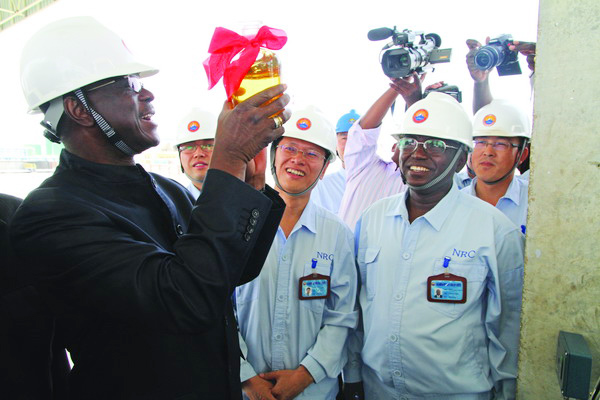|
 Chad's Prime Minister Emmanuel Nadingar holds a bottle of home produced gasoline. In 2011 April, CNPC's rig in Chad came on stream. Just four months later, the new refinery near N'Djamena was put into operation. For the first time in Chad's history, the country was able to supply itself with home produced gasoline and diesel. [Photo/China Daily] |
EnCana, a Canadian oil company, failed to spot productive reserves in the country after five years of prospecting.
But Dou Lirong, general manager of CNPC International (Chad) Co Ltd. (CNPCIC), believed there would be large potential crude oil resources based on his expertise and previous experience in China and Sudan.
Four months after the purchase, CNPC's trial rig successfully spotted a commercial oil flow, though the oil was too heavy to be developed economically. Encouraged by the find, Dou decided to mobilize the second drilling rig.
Just like the scenario in Niger, the process was interrupted by a coup in early 2008. Dou and his colleagues experienced an evacuation and after the turmoil ended and the president, Idriss Dby Itno, was returned to office, CNPC employees returned to the country.
Good fortune has accompanied them since. In 2009 April, CNPCIC found a high-production light oil flow, followed by several other important finds.
In April 2011, CNPC's first production well in Chad came on stream. Just four months later, a new refinery became operational near N'Djamena, which is 60 percent owned by CNPC International and 40 percent owned by the Chadian Government. For the first time in Chad's history, the country was able to supply itself with home-produced gasoline and diesel.
"The project brought job opportunities for Chad. And Chadians have enjoyed favorable oil prices since CNPC's refinery became operational a year ago," said Brahim Alkhalil Hileoiu, Chad's energy and petroleum minister.
"China was often accused of only being interested in Africa's natural resources," Yang Guangyu, China's former ambassador to Chad, said at the completion ceremony of the refinery.
"But people will think it is unfair to say this if they know that only 13 percent of Africa's oil was exported to China."
"The refinery is a convincing example of how we can bind each other's interests together. It not only belongs to China, but also to Chad," Yang said.
However, challenges still remain.
Both in Niger and Chad, the domestic markets are too small to justify refineries running at full capacity. Without an international pipeline, the oil can hardly be exported to the international market from these landlocked nations.
But experts said the Nigerien and Chadian projects are typical of China's energy cooperation with Africa as a latecomer to the continent.
Chinese companies have to take exploration blocs that other companies might see as valueless, but thanks to their technology and hard work, they have routinely tapped surprisingly good oil reserves.
